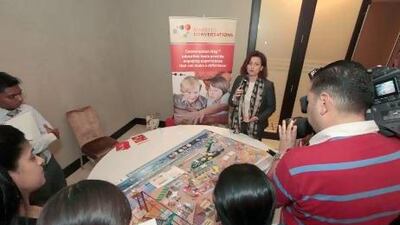DUBAI // Diabetics should see their doctors a month before Ramadan to find out if they can fast and plan a way to do it without harming themselves, doctors say.
Fasting in the holy month presents special challenges and risks to Muslims with diabetes, said Dr Abdulrazzaq Al Madani, chairman of the Gulf Group for the Study of Diabetes.
"If you want to fast in Ramadan then you have to achieve good diabetes blood sugar control a month before," Dr Al Madani said.
He was speaking at the launch of an instructional poster, or "map", called Managing Diabetes during Ramadan.
Available in seven languages, the graphic guide is designed for doctors, nurses or dietitians to use with groups of three to 10 patients.
It was created by the health education company Healthy Interactions, in collaboration with the International Diabetes Federation, the Gulf Group for the Study of Diabetes and Lilly, a company that makes diabetes medications.
"We gathered the advice of several physicians from across the Middle East region," said Dr Mohammed Samir, medical director at Lilly.
Ramadan will begin in July this year. Muslims who are ill are exempt from fasting but many want to anyway.
"Ramadan is a special month," Dr Al Madani said. "It is not only because it is a holy month and everybody wants to fast, but it has its own atmosphere and everybody wants to share that."
Doctors should advise diabetics about the risk of complications if they fast, but they cannot keep patients from trying, he said.
"At the end, fasting or not fasting is a personal decision," Dr Al Madani said.
Diabetics who face a high risk of complications if they fast include pregnant women, patients who need insulin injections and those whose blood-sugar levels were fluctuating severely before Ramadan.
If they decide to fast, diabetics should not overeat when they break their fast at sunset, which can cause blood sugar levels to rise dangerously, Dr Al Madani said. "They can eat a little, wait, do their praying and later on eat a little more," he said.
They should wake up before dawn to eat suhoor, their second meal, so they shorten the period of fasting as much as possible.
"The risk of developing hypoglaecemia will be less, the risk of developing dehydration will be less," Dr Al Madani said.
Finally, diabetics should plan to test their blood-sugar levels while fasting, including in the middle of the day and before they break their fast.
Dr Al Madani denied that testing blood sugar invalidates fasting.
"That is not true," he said. "We have asked the mullahs and people who have good knowledge that this can be done, and it will not break their fast."
Fadia Doumani, head of the patient support programme at Lilly, said the best thing about the poster was its accessibility.
"What is excellent about this map is it is very simple for anyone, whether he is highly educated or he is illiterate," Ms Doumani said.
The poster reinforces the importance of patients working with their doctor to create a specific plan for Ramadan.
"If they take the decision to fast they have to make a big plan," Ms Doumani said.
"How much should I test, when should I test, what are the numbers I should be having?"
The posters will be available at government and private health centres in the UAE and across the Arabian Gulf, Dr Samir said.
"The maps are going to be rolled out within the next few weeks," he said.
It is the eighth in a series of similar educational posters, all addressing different aspects of diabetes.
Almost 19 per cent of the UAE population suffers diabetes, the International Diabetes Federation says.

